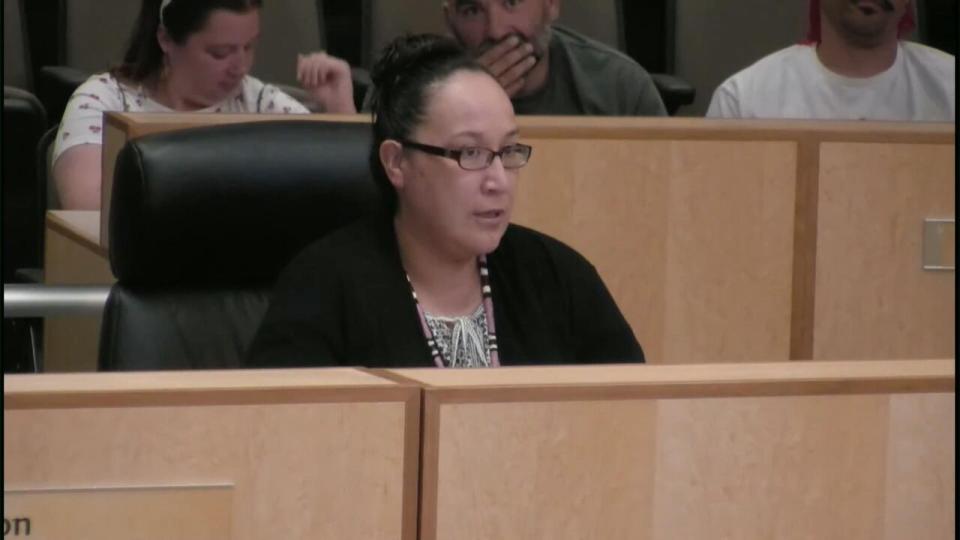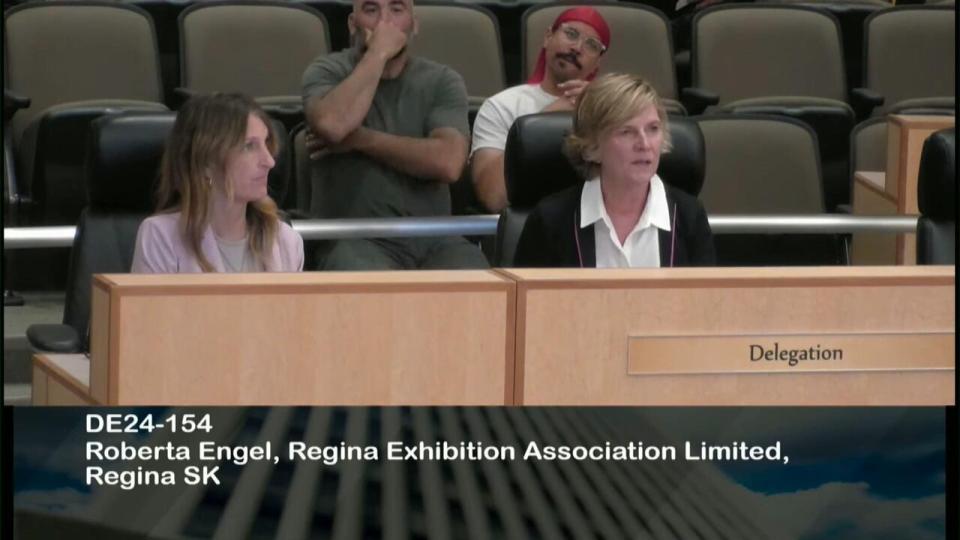Regina city council pushes vote on renaming Dewdney Avenue to August
Dewdney Avenue and its namesake's troubling history were a focus at Regina city council's meeting on Wednesday, but those in favour of changing the street name will have to wait until later this summer to see whether their wish comes true.
On Wednesday, council considered a motion to rename Dewdney Avenue. After listening to several speakers, councillors decided to table the vote until August.
Dewdney is a large road that bisects the city from east to west. Community organizers have been advocating to change the name for several years, as an act of Truth and Reconciliation calls to action.
Edgar Dewdney was lieutenant-governor and Indian commissioner in the North-West Territories, which at the time stretched over much of what is now the Canadian Prairies, from 1879 to 1888. He chose Regina as a capital before the province was even created.
Dewdney has a dark history of relations with Indigenous people. He contributed to a starvation crisis for Indigenous people by deliberate extermination of buffalo herds and limitation of food rations. He also helped with the creation of Canada's reserve system and residential schools.
Lisa Sunshine, an Indigenous adviser at Ignite Adult Learning in Regina, was among multiple speakers who advocated for the renaming Wednesday.
"It is time to make a change to face the truth of Regina's dark colonial past," Sunshine, who is from Fishing Lake First Nation, said.
"Changing the name of Dewdney Avenue would be a remarkable legacy to take those steps forward in supporting reconciliation."

Sunshine said she is one of thousands of people still negatively affected by the residential school system Dewdney helped create.
"Edgar Dewdney was an active participant in the genocide of Indigenous peoples," she said.
Speaking on behalf of the Regina & District Labour Council, Darin Milo said there are many reasons why the street name should be changed.
"It only serves to honour someone who was pro-genocide," Milo said. "There's no debate about the harm done by the residential schools: abuse, force, indoctrination."
Coun. Andrews Stevens and Coun. Dan LeBlanc have been pushing for the name change. They say keeping the name contributes to a harmful environment for Indigenous people.
The motion before council calls for the city to rename the street as soon as possible, or by the first quarter of 2025. Tatanka, which means buffalo, has been suggested as a new name.
"The process of renaming is a decision to move forward in a good way, that is inclusive of all residents who have been most harmed by infrastructure and the legacy of a genocidal figure," said Lisa Odle, who spoke on behalf of Righting Relations Canada.
The city has said the renaming process could cost millions.
Some of the people in favour of the renaming disagreed with council's decision to delay the vote.
"This is a low hanging fruit for reconciliation action," said Andrea Soesenberg, a community member who spoke at council. "If it's taken us this long to complete this action, what does that say about our commitment to reconciliation?"
REAL staying afloat
While the decision to rename Dewdney Avenue was postponed, city councillors did take part in a vote at their meeting on Wednesday.
Seven councillors voted in favour of letting Regina Exhibition Association Ltd. (REAL) continue operating as a municipal corporation with a new hybrid model and focused mandate, while three were against.
Councillors voted to implement some recommendations from MNP — a consulting firm — to deal with REAL's millions of dollars of debt.
REAL has been directed to put forward a new group of permanent board members chosen by city council and to deliver a short-term financial plan that provides solutions to stabilize the municipal corporation's financial woes by Sept. 30.
Roberta Engel, REAL's interim president and CEO, said REAL supports those recommendations but implementing them could take some time.
"The situation that REAL finds itself in today did not happen overnight. Debt has been incurred since 2017 supporting capital investment in the property and recovery from the pandemic, and gaining an appreciation of this is going to take some time," Engel said.
"For REAL to fully recover within the foreseeable future, REAL will need debt, capital and operating funding, while we aim to reduce operational funding dependency. This transition will take time."

Engel added it could be difficult to find people to fill the new board by the end of September.
"July and August are months where people are away and maybe not looking for board opportunities," Engel said. "We hope the public and that people want to come back and be part of this great board and be part of this great organization. We're just highlighting that it may take a little bit longer over the summer months."
REAL was also directed to outsource big event bookings such as concerts at Mosaic Stadium and the Brandt Centre to a third party contractor in order to reduce financial risk.
Engel said she would like REAL to wait to get this directive done until their new board and CEO is in place, but added the municipal corporation is already outsourcing some of its food and event services.
Listen: Regina's mayor talks about renaming Dewdney Avenue and the future of REAL:
Mayor Sandra Masters said it's important for a financial analysis to be completed if REAL were to outsource all of its big event bookings because the city will assume fees and risk to enter a contract with a third-party group.
"Concerts for the community are really important because it brings new money into the city and provides culture and [an event] that people like to attend, which has a positive impact on the city, but they may not be money making ventures for the venue itself, " Masters said on CBC Radio's The Morning Edition.
"How much off the top do they [third-party contractors] take and how much risk do they take on, and I think what we heard yesterday is that the risk that folks are willing to take on would be minimal."


